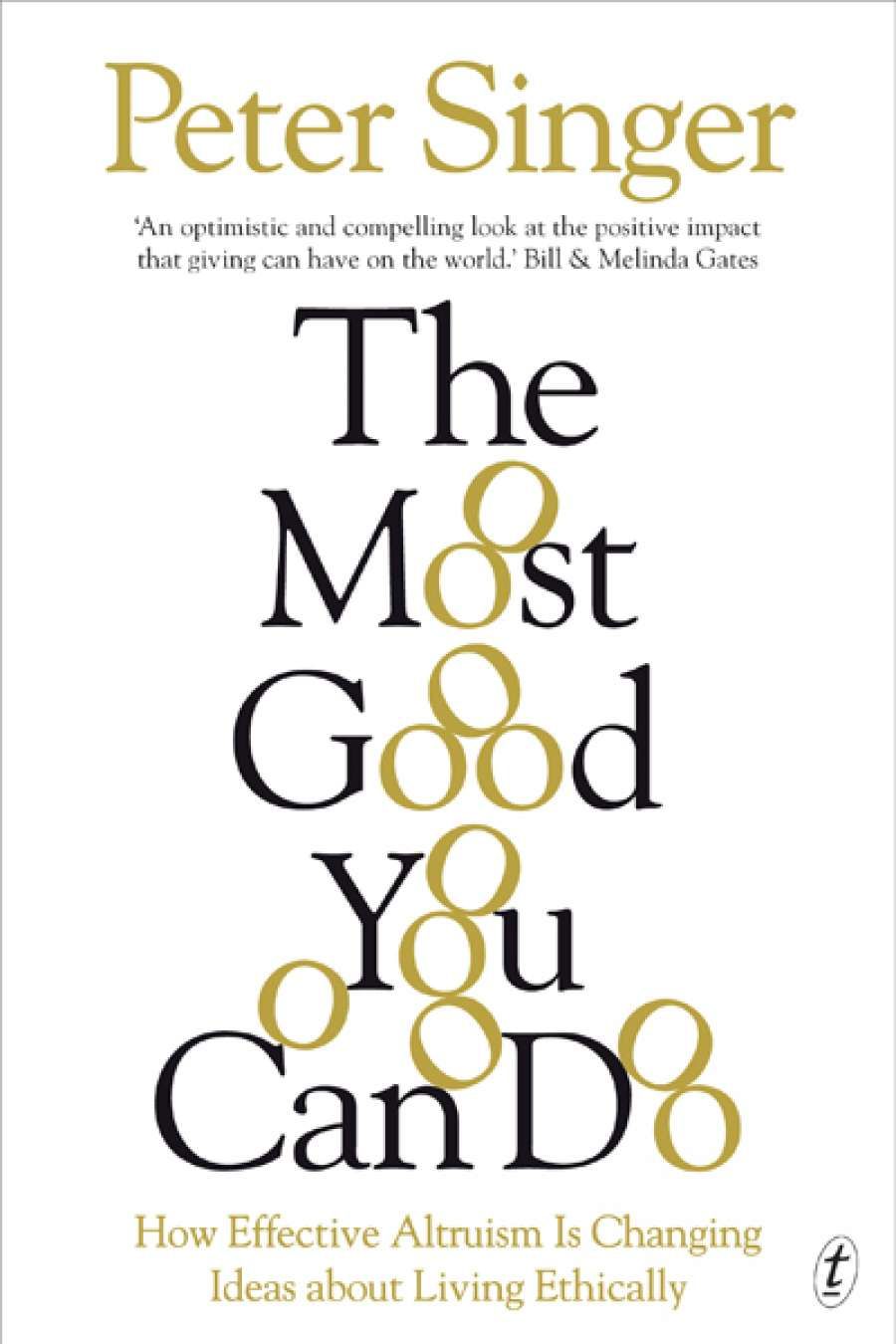
- Free Article: No
- Contents Category: Philosophy
- Custom Article Title: Ian Ravenscroft reviews 'The Most Good You Can Do' by Peter Singer
- Book 1 Title: The Most Good You Can Do
- Book 1 Subtitle: How Effective Altruism is changing ideas about living ethically
- Book 1 Biblio: Text Publishing, $32.99 pb, 226 pp, 9781922182692
At the core of The Most Good You Can Do is the fact that a significant proportion of the world’s population lives in extreme poverty. According to the World Bank, about two billion people live on less than two US dollars a day. (This figure is given in terms of ‘purchasing power parity’.) Now, I buy a coffee most days that costs about four dollars. Were I to forsake my daily coffee I could, even taking into account the administration costs charities incur, double the income of one very poor person. The utilitarian urges me to give away my coffee money because the gains of the person whose income I would double greatly exceed the pleasure I receive from my daily cup of coffee.
Singer provides many examples of people who give away significant amounts of their resources to relieve suffering. He uses the term ‘effective altruists’ to describe the people he portrays. They are altruists for obvious reasons – they give resources to others less fortunate than themselves – and they are effective because they carefully assess the available mechanisms for relieving suffering. For example, effective altruists seek information about the most efficient charities, avoiding those with excessive administration costs. Section 4 of The Most Good You Can Do provides useful information about charities’ effectiveness, and at the end of the book is a note identifying some particularly effective Australian charities.
A typical effective altruist Singer describes is Toby Ord, an Australian who completed a PhD in philosophy at Oxford. Influenced by Singer’s academic paper, ‘Famine, Affluence and Morality’, Ord decided to retain for himself £18,000 of his annual income and to give the rest to effective charities. His partner, Bernadette Young, made a similar decision and together they founded the not-for-profit organisation, Giving What You Can, which encourages others to give away at least ten per cent of their income.
 Peter Singer speaking at a Veritas Forum event on MIT's campus, 14 March 2009 (photograph by Joel Travis Sage via Wikimedia Commons)
Peter Singer speaking at a Veritas Forum event on MIT's campus, 14 March 2009 (photograph by Joel Travis Sage via Wikimedia Commons)
Singer lucidly explores other avenues for the effective altruist to pursue. One of the most striking is giving away a body part to save another’s life. Singer describes the case of Zell Kravinsky, who donated a kidney to an anonymous stranger in acute kidney failure, reasoning that the cost to him was far less than the benefit to the stranger. Singer also discusses the kind of career an aspiring altruist should pursue. Surprisingly, Singer does not advocate that all effective altruists become charity workers. In a few cases that may be the right career choice, but in general altruists should seek highly paid careers so they have more money to give away.
Singer advances the astonishing claim that, under extreme circumstances, the effective altruist should take a job in a concentration camp. Imagine that the best paying job in Nazi Germany was being a guard at Auschwitz. If Otto takes the job, he can direct more resources to the poor than had he not. If he doesn’t take the job, someone else will – someone who may more energetically slaughter innocents than Otto. Thus the utilitarian calculus requires Otto to take the job.
‘Singer advances the astonishing claim that, under extreme circumstances, the effective altruist should take a job in a concentration camp’
Bentham stressed that it is not humanly possible to always calculate the consequences of our actions, so we must instead adopt ways of life that will probably maximise happiness. Adhering to the rule ‘Don’t be a guard at a concentration camp’ is in most circumstances going to maximise welfare. But Bentham was not advocating rule fetishism: we must always keep an eye on the overall picture and reject the rule in cases where it fails to maximise welfare. Singer may have described such a case.
Philosophers opposed to utilitarianism sometimes argue that it is too demanding: it asks too much of us. Surely I can enjoy a cup of coffee? Singer discusses one version of the demandingness argument against utilitarianism. On Bernard Williams’s view, the effective altruist is abandoning his or her life projects, and by doing so they abandon their integrity. But as Singer points out, altruists like Toby Ord have neither given up their life projects nor abandoned their integrity. Moreover, as a source of satisfaction, giving typically trumps high levels of consumption and so is not as demanding as it may appear. We can also wonder about the life projects and integrity of the very poor. How is it that my life projects and integrity are so much more valuable than a starving person’s?
The Most Good You Can Do is an important book. Reading it may change your life and save someone else’s


Comments powered by CComment